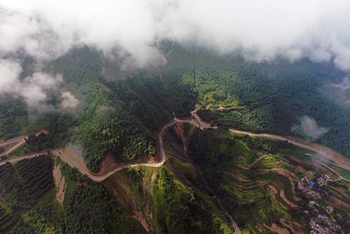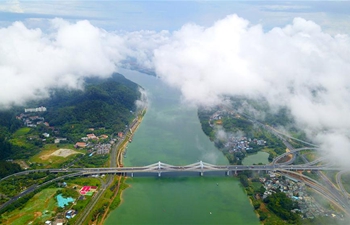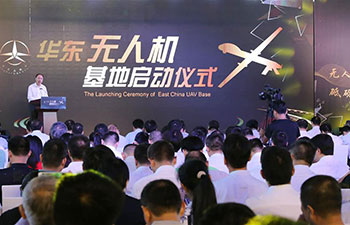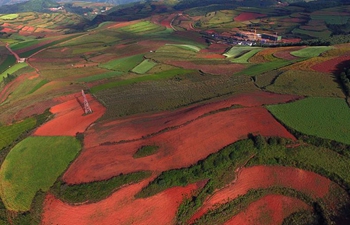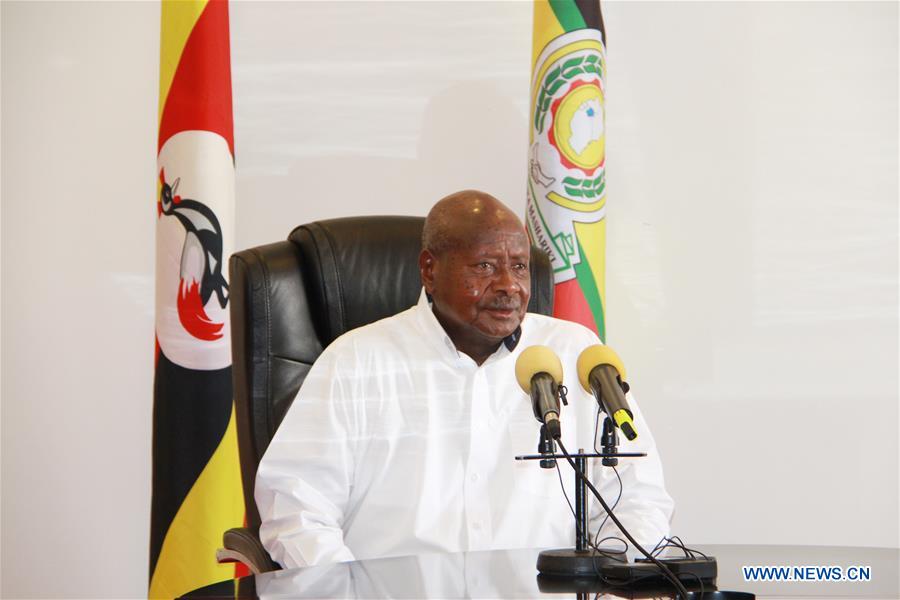
Ugandan President Yoweri Museveni recieves an interview with Xinhua in Entebbe, Uganda, Aug. 26, 2018. Ugandan President Yoweri Museveni said the Belt and Road Initiative (BRI) is crucial to Africa's fast-track development by opening up the continent for more trade within and with outside it. (Xinhua/Zhang Gaiping)
by Ronald Ssekandi, Zhang Gaiping
ENTEBBE, Uganda, Aug. 30 (Xinhua) -- Ugandan President Yoweri Museveni said the Belt and Road Initiative (BRI) is critical to Africa's fast-track development by opening up the continent for more trade within and with outside it.
Museveni told Xinhua in a recent interview that the China-proposed Initiative, based on the experience of the ancient Silk Road that linked Europe to Asia, is critical to a fast-track economic development in Africa.
Compared to the ancient trade route, "Now we are using modern means to link in order to trade, and so I benefit from you and you benefit from me. These routes can be road routes, waterways or airways. They are all called routes," Museveni said.
He said Uganda is already benefiting from the Initiative that is expected to link the landlocked country to the outside world. He cited the Chinese-built Kampala-Entebbe Expressway linking the Ugandan capital to Entebbe International Airport, the country's gateway to the world.
China is also financing the expansion and upgrading of Entebbe International Airport so that it is able to better handle passenger and cargo traffic to and from the east African country.
Official figures show that after completion of the first phase of the airport expansion, the cargo center can handle up to 150,000 metric tonnes of goods, compared to the previous 69,000 metric tonnes.
Museveni, who will attend the Beijing Summit of the Forum on China-Africa Cooperation (FOCAC) on Sept. 3-4, said he will be seeking China's assistance in building the Standard Gauge Railway (SGR) to link his country to the Kenyan seaport of Mombasa. Kenya is already constructing its section of the SGR leading to Uganda.
"We are likely to advance the project of the Standard Gauge Railway that is in the government-to-government (talks)," he said.
Experts say the SGR will reduce the cost of transport and spur economic development. The railway line is also expected to reach the border areas with Rwanda, South Sudan and the Democratic Republic of the Congo.
It will shorten the trip between Mombasa and Kampala to only two days from the current 14 days, according to the Ugandan government. It is planned that a freight train will be able to carry up to 216 20-foot containers and travel at a speed of 100 km per hour, while a passenger train transporting up to 960 people at a speed of 120 km per hour.
Museveni said he supports the idea of aligning the BRI with the United Nations sustainable development goals, and regional and national development plans.
"To align policies ... if you say you want Uganda to become a modern country, then you need electricity, piped water, modern telephones, and transport," he said.
Museveni said he also supports the China-proposed vision of building a community of a shared future for mankind.
"That is how it should have been in the beginning. Even from a selfish point of view, it is good that I am rich but you are also rich. Because when you are rich and I am also rich, I can buy from you and you can buy more from me," Museveni said.
Uganda agrees with China on supporting multilateralism as opposed to unilateralism, and that globalization is an irreversible trend.
Museveni said China plays a positive role in global affairs, while noting, "It has helped Africa to get out of the blackmail of some of the Western countries, which wanted to treat African countries as if they are slave countries."
The Ugandan president said Uganda and China share similar interests in international affairs.
Politically, "China does not believe in imperialism, we don't believe in imperialism. We don't believe in other countries interfering in the affairs of other countries," he said.
"Maybe what you should concentrate on is economic cooperation. Even there, we have never had a problem only that at the beginning China was also still a developing country but now they have got much more capacity, they have helped us so much," Museveni said.




